-
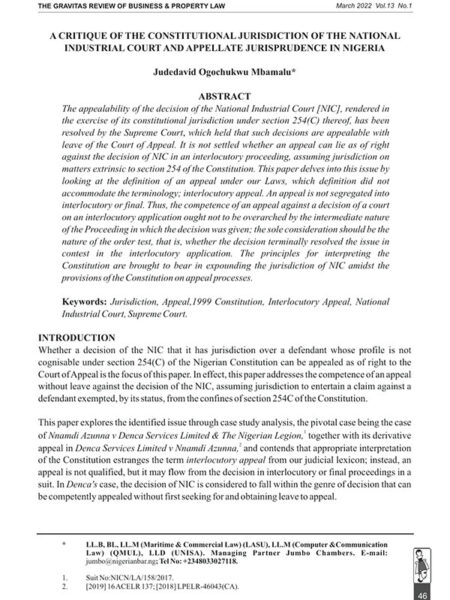
A Critique of the Constitutional Jurisdiction of the National Industrial Court and Appellate Jurisprudence in Nigeria
0₦2,500.00Dr Judedavid Mbamalu, Managing Partner of Jumbo Chambers, in his paper, A Critique of the Constitutional Jurisdiction of the National Industrial Court and Appellate Jurisprudence in Nigeria, argues that while the appealability of the decision of the National Industrial Court (NIC), rendered in the exercise of its jurisdiction under section 254(C) of the 1999 Constitution of Nigeria has been resolved by the Supreme Court, it is not settled whether an appeal can lie as of right against the decision of the NIC in an interlocutory proceeding, assuming jurisdiction on matters extrinsic to section 254. Dr Mbamalu argues that the segregation of appeals into ‘interlocutory’ and ‘final’ is unknown to ‘our Statutes and Rules of Court’, and the competence of an appeal against a decision of a court on an interlocutory application ought not to be overarched by the intermediate nature of the Proceeding in which the decision was given. He elaborates on the principles for interpreting the Constitution in expounding the jurisdiction of the NIC amidst the provisions of the Constitution on appeal processes.
-
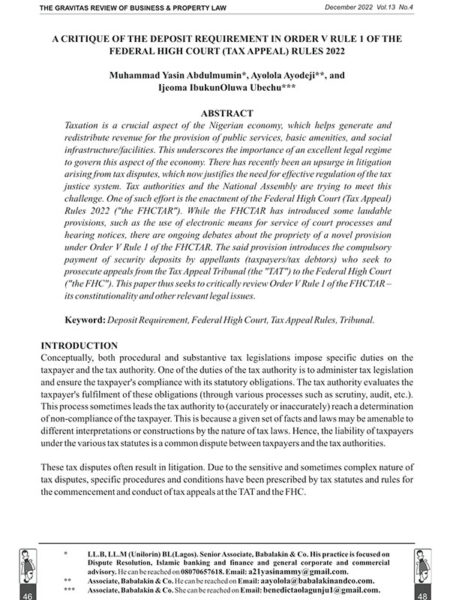
A Critique of the Deposit Requirement in Order V Rule 1 of the Federal High Court (Tax Appeal) Rules, 2022
0₦2,500.00Muhammad Abdulmumin, Ayolola Ayodeji and Ijeoma Ubechu, all of Babalakin & Co, in their article, A Critique of the Deposit Requirement in Order V Rule 1 of the Federal High Court (Tax Appeal) Rules, 2022, examine the provision of the Federal High Court (Tax Appeal) Rules 2022 (the FHCTAR) which introduces the compulsory payment of security deposits by appellants (taxpayers/tax debtors) who seek to prosecute appeals from the Tax Appeal Tribunal to the Federal High Court. Abdulmumin et al in their brilliant article, critically review Order V Rule 1 of the FHCTAR, its constitutionality, and other relevant legal issues.
-
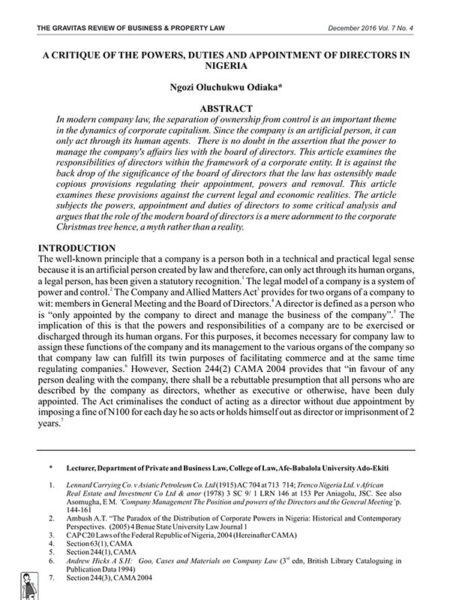
A Critique of the Powers, Duties and Appointment of Directors in Nigeria
0₦2,500.00Odiaka Ngozi of the Department of Private and Business Law, Afe-Babalola University, Ado-Ekiti in his article “A Critique of the Powers, Duties and Appointment of Directors in Nigeria” analyses the appointment, powers and duties of directors and distribution of corporate powers in a company. He explores the historical basis of the modern board structure and argues that the legal position that the board manages the company does not reflect practical realities as real corporate powers are wielded by ‘higher executive directors’ while the board of directors plays mere supervisory roles. He recommends a reform of the law to make the board more proactive.
-
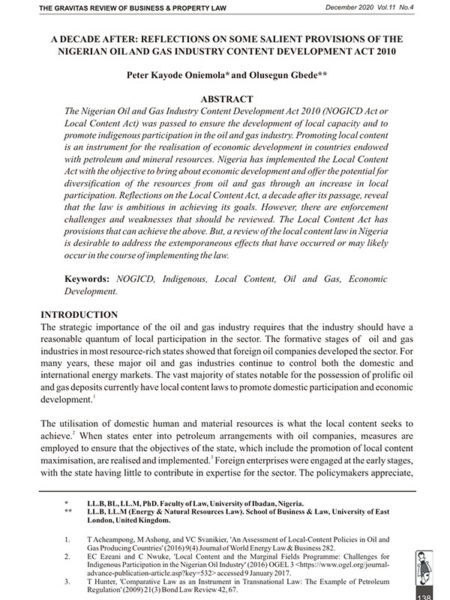
A Decade After: Reflections on Some Salient Provisions of the Nigerian Oil and Gas Industry Content Development Act 2010
0₦2,500.00Dr Peter Oniemola of the Faculty of Law University of Ibadan Nigeria and Olusegun Gbede of the School of Business & Law University of East London the United Kingdom in their article, A Decade After: Reflections on Some Salient Provisions of the Nigerian Oil and Gas Industry Content Development Act 2010, review the provisions of the Nigerian Oil and Gas Industry Content Development Act against the essence and expectation of the Act. They consider the achievements of the Act and challenges in realising its objectives.
-
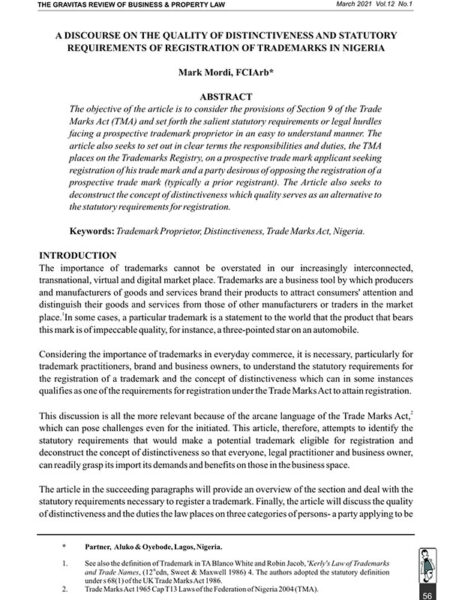
A Discourse on the Quality of Distinctiveness and Statutory Requirements of Registration of Trademarks in Nigeria
0₦2,500.00Mark Mordi, Partner Aluko & Oyebode in, A Discourse on the Quality of Distinctiveness and Statutory Requirements of Registration of Trademarks in Nigeria, deconstructs the concept of distinctiveness which quality, serves as an alternative to the statutory requirements for registration. Mordi examines the responsibilities and duties the Trade Marks Act 1965 places on the Trademarks Registry, on a prospective trademark applicant seeking registration of his trademark, and a party desirous of opposing a trademark registration (typically a prior registrant).
-
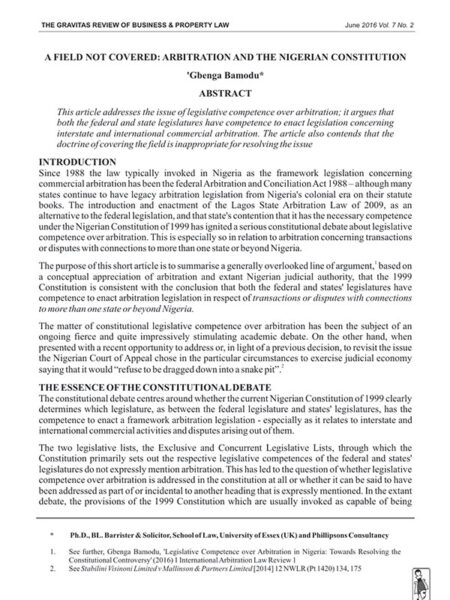
A Field Not Covered: Arbitration and The Nigerian Constitution
0₦2,500.00Dr Gbenga Bamodu of the School of Law, University of Essex (UK) in a counterpose to a previous article published in The Gravitas Review argues in “A Field Not Covered: Arbitration and The Nigerian Constitution” that the doctrine of “covering the field” is inappropriate in the context of legislative competence over arbitration in Nigeria in holding that states’ legislatures cannot legislate on arbitration in view of the federal Arbitration and Conciliation Act 1988. Synthesising a range of sources including decided cases, he posits that states’ legislatures also have legislative competence over arbitration concerning interstate or international transaction disputes.
-
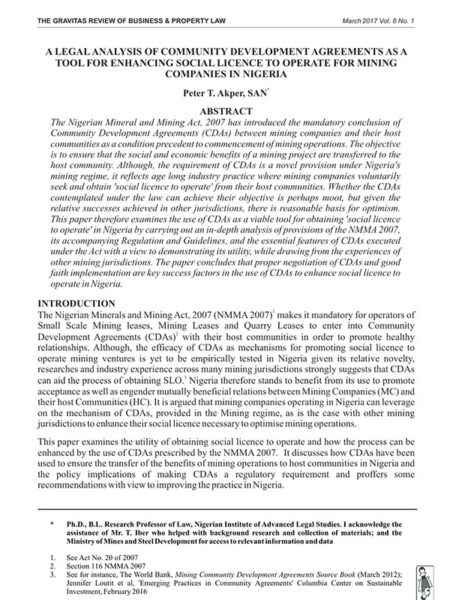
A Legal Analysis of Community Development Agreements as a Tool for Enhancing Social Licence to Operate for Mining Companies in Nigeria
0₦2,500.00Professor Peter Akper, SAN of the Nigerian Institute of Advanced Legal Studies in his article “A Legal Analysis of Community Development Agreements as a Tool for Enhancing Social Licence to Operate for Mining Companies in Nigeria” examines the provision of the Nigerian Mineral and Mining Act 2007 which introduced the mandatory conclusion of Community Development Agreements (CDAs) between mining companies and their host communities as a condition precedent to commencement of mining operations. He examines CDA as a ‘Social Licence to Operate’ , its essential features and enforceability. He concludes by x-raying three typical CDAs concluded by mining companies with Gimbi, Durumi and Piyyakasa communities.
-
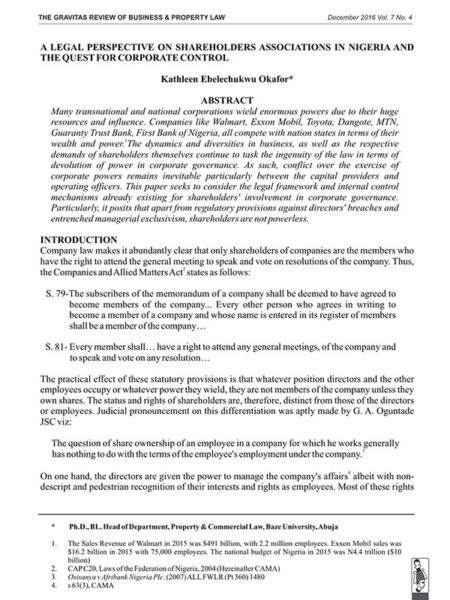
A Legal Perspective on Shareholders Associations in Nigeria and the Quest for Corporate Control
0₦2,500.00Dr Kathleen Okafor, Head, Department of Property & Commercial Law, Baze University, Abuja in “A Legal Perspective on Shareholders Associations in Nigeria and the Quest for Corporate Control” examines the origin and activities of shareholders’ association in context of the conflict over the exercise of corporate powers between the capital providers and operating officers. She explores the legal framework and control mechanisms existing for shareholders’ involvement in corporate governance and posits that apart from regulatory provisions against directors’ breaches and entrenched managerial exclusivism, shareholders are not powerless.
-
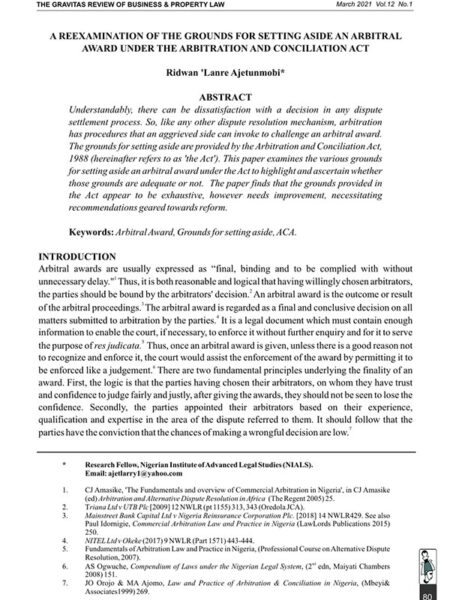
A Reexamination of the Grounds for Setting Aside an Arbitral Award Under the Arbitration and Conciliation Act
0₦2,500.00Ridwan Ajetunmobi, Research Fellow at the Nigerian Institute of Advanced Legal Studies, in his article, A Reexamination of the Grounds for Setting Aside an Arbitral Award Under the Arbitration and Conciliation Act, critically examines the various grounds for setting aside an arbitral award under the ACA. Ajetunmobi considers the adequacy of the grounds, the procedure for, and the legal effect of, setting aside an award. He proffers recommendations for further reform.
-
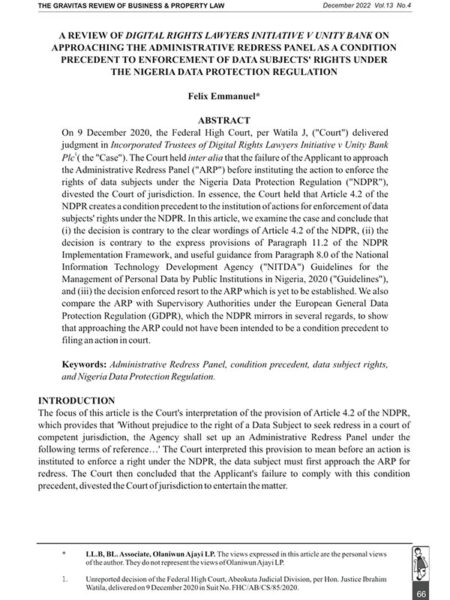
A Review of Digital Rights Lawyers Initiative V Unity Bank on Approaching the Administrative Redress Panel as a Condition Precedent to an Action Under the Nigeria Data Protection Regulation
0₦2,500.00Felix Emmanuel, Associate at Olaniwun Ajayi LP, in his article, A Review of Digital Rights Lawyers Initiative V Unity Bank on Approaching the Administrative Redress Panel as a Condition Precedent to an Action Under the Nigeria Data Protection Regulation, critically examines the decision of the Federal High Court in Incorporated Trustees of Digital Rights Lawyers Initiative v Unity Bank Plc (the “Case”) where the Court held that the failure of the Applicant to approach the Administrative Redress Panel before instituting the action to enforce the rights of data subjects under the Nigeria Data Protection Regulation (“NDPR”), divested the Court of jurisdiction. The Court held that Article 4.2 of the NDPR creates a condition precedent to the institution of actions to enforce data subjects’ rights under the NDPR. Emmanuel masterfully examines all aspects of the Case against the backdrop of relevant laws and regulations.
-
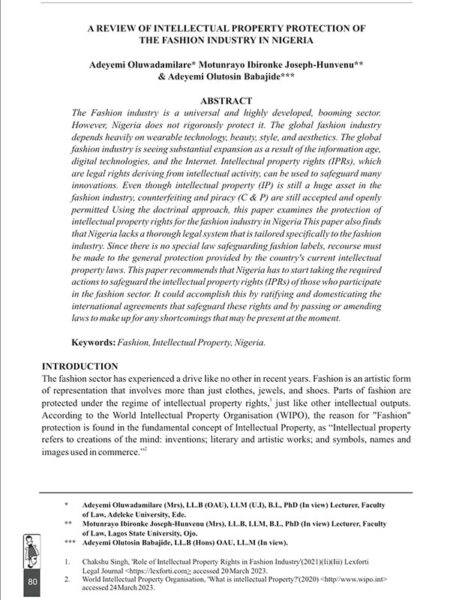
A Review of Intellectual Property Protection of the Fashion Industry in Nigeria
0₦2,500.00Adeyemi Oluwadamilare, Motunrayo Joseph-Hunvenu and Adeyemi Babajide, in their article, A Review of Intellectual Property Protection of the Fashion Industry in Nigeria, explore the legal regime for the protection of intellectual rights in the fashion industry in Nigeria. The fashion industry is a universal and highly developed, booming sector. However, Nigeria does not rigorously protect it. The global fashion industry depends heavily on wearable technology, beauty, style, and aesthetics. The industry is seeing substantial expansion as a result of the information age, digital technologies, and Internet. Intellectual property rights (IPRs), which are legal rights deriving from intellectual activity, can be used to safeguard many innovations. Despite the fact that intellectual property (IP) is still a huge asset in the fashion industry, counterfeiting and piracy are accepted and openly permitted. Using the doctrinal approach, this paper examines the protection of IPRs for the fashion industry in Nigeria The paper finds that Nigeria lacks a thorough legal system that is tailored specifically to the fashion industry. Since there is no special law safeguarding fashion labels, recourse must be made to the general protection provided by the country’s current intellectual property laws. The paper recommends that Nigeria has to start taking the required actions to safeguard the IPRs of those who participate in the fashion sector. It could accomplish this by ratifying and domesticating the international agreements that safeguard these rights and by passing or amending laws to make up for any shortcomings that may be present at the moment.
-
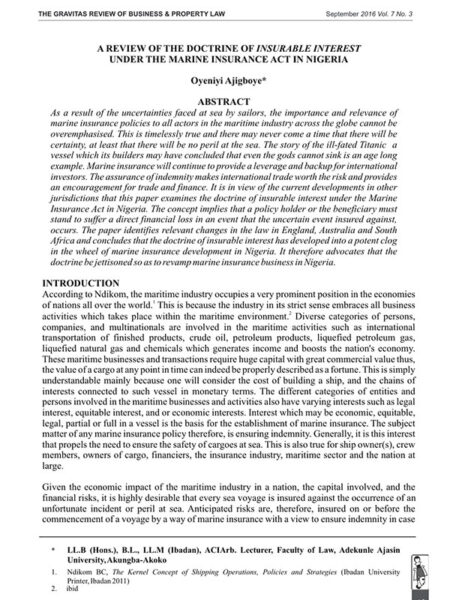
A Review of the Doctrine for Insurable Interest under the Marine Insurance Act in Nigeria
0₦2,500.00Oyeniyi Ajigboye, Lecturer, Faculty of Law, Adekunle Ajasin University, Akungba-Akoko, in his article “A Review of the Doctrine of Insurable Interest under the Marine Insurance Act in Nigeria” gives an overview of the doctrine of insurable interest in marine insurance. The concept implies that a policy holder or the beneficiary must stand to suffer a direct financial loss in an event that the uncertain event insured against, occurs. He identifies relevant changes in the law in England, Australia and South Africa and concludes that the doctrine of insurable interest has developed into a potent clog in the wheel of marine insurance. He advocates that the doctrine be jettisoned so as to revamp marine insurance business in Nigeria.
The Gravitas Review of Business & Property Law



